
views
Avoiding Tough Mornings

Avoid caffeine and alcohol the night before. Substances like coffee and liquor stay in our bodies for a long time-- anywhere from 3-8 hours. This can profoundly affect your ability to fall asleep and to enter deep sleep, which will make you groggy in the morning. Avoid caffeine in the afternoons and evenings to make sure it is out of your system when you go to sleep. Drink alcohol in moderation and with plenty of water, as getting out of bed is doubly hard when you have a hangover.

Get enough sleep. Adults need 7-8 hours of sleep every night, children 8-9 hours, and toddlers and infants much more. If you are not getting enough sleep the night before then you will always feel tired when you try to wake up. Refer to the graph, but know that not everyone is the same... If you can’t get all the sleep you need at night, try resting in the afternoon to make up some of the lost time.
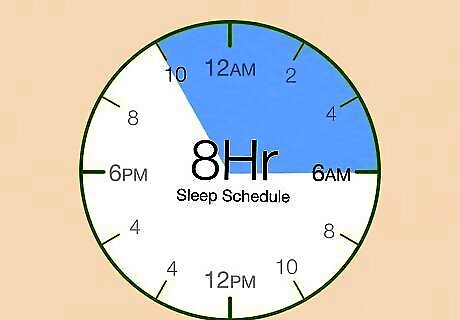
Learn your personalized sleep cycle. Waking up in the middle of your REM cycle will leave you exhausted, and it is tough to get yourself out of bed when you were just in a deep sleep. Luckily, your body naturally begins to wake up several hours before you actually get out of bed, and if you can sync this process up with your alarm clock you will find getting out of bed much easier. To learn your sleep pattern: Set a time to go to sleep every night for two weeks. Use a time, like vacation, when you do not need to get up at a specific time in the morning. Go to sleep at the same time every single night, including weekends. Make a note of the moment you wake up, even if it is before your alarm goes off. Continue going to bed at the exact same time until you begin waking up at a consistent time. Count the hours between this time and your bedtime, and you'll know how long your body's natural sleep cycle is. Start timing your alarm so you wake up when your body wants to.

Adjust your sleep cycle with lighting cues. While our sleep patterns are largely genetic, we can do several small things to make our body adapt to a new sleep pattern. The number one trigger for sleep is light. As light fades at night, our body produces melatonin, which naturally makes us sleepy. And when we see or feel sunlight in the morning our body is triggered to wake-up naturally and stop melatonin production. That’s why the healthiest sleep pattern is waking up early with the sun. At night, work with dimmed lights and try not to use bright smartphone or laptop screens before going to sleep, as bright light stops melatonin production. Crack your curtains open or step outside quickly when you wake up. The sunlight tells your body to get started with the day.
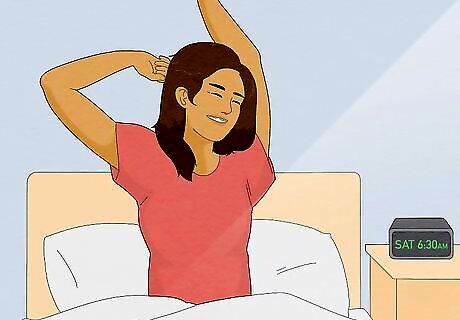
Keep your sleep patterns consistent on weekends. Resist the urge to sleep in on the weekends, as it disrupts your body's natural cycle and makes it much harder to get up on Monday. Your body expects to get up at certain hours, but if you change those hours frequently it can lead to sleep issues and difficulty getting out of the covers on work days. The more consistent you can keep your sleep schedule, the easier it will be to get up. Most humans can only adjust their sleep schedules an hour or so a day, so try to avoid rapidly changing bedtimes.
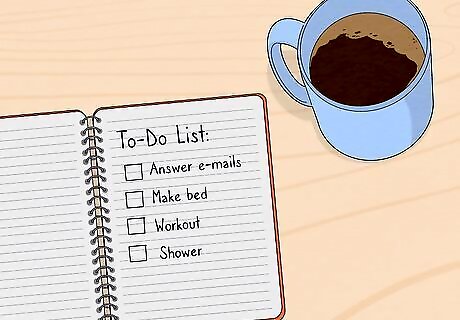
Prepare your morning the night before. Keep a pair of slippers and a warm robe by your bed, grind coffee, and organize your bag the night before so that you can focus on waking up, not on the chores you have to do. Just knowing that coffee is only a button press away can make a big difference on your desire to get out of bed. You might want to make a to-do list the night before. That why, you'll feel more prepared for the day and can put all your energy into waking up instead of worrying about the things you need to accomplish.
Getting Out of Bed in the Morning
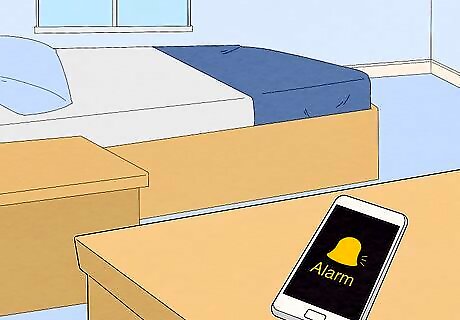
Move your alarm clock away from the bed. Make yourself get up and out of bed to turn off your alarm. This gives you no choice but to wake up and turn off the noise, and once you are out of bed it is much easier to stay out of it. Set your alarm to go off with upbeat music. Most phones can use any song as an alarm, and many alarm clocks can use the radio to wake you up. If you are still having trouble, try buying a natural light alarm clock, which wakes you up with light instead of sound. It’s ok to use more than one type of alarm clock while you’re figuring out what works best for you.

Drink a glass of water. Drinking a glass of water replenishes the water you lost from sweating and exhaling during the night and is proven to kickstart your metabolism, making it much easier to get your body moving in the morning. Put a full cup of water by your bed before you go to sleep so that it is ready in the morning. Chewing mint or citrus flavored gum may also lead to faster feelings of alertness.

Stretch your muscles. This needs to be more than just arching your back and yawning. Sit up and touch your toes, pull your knees to your chest, and do some light yoga if you are really struggling. Stretching forces blood to move throughout your body and into your brain, waking you up quickly but gradually. Find the exercises and stretches that work for you and do them every morning. Add some gentle music to complete the experience, if you’d like.

Make yourself cold. One of the most common reasons why we feel groggy or drowsy is because we are too warm. Warmth, like sleep, slows down our metabolism and our mind, so throw the covers off, remove a layer of clothes, or open a window when you need to get up. Do this when you wake up, not when you sleep, as feeling cold can prevent you from having a good night's rest.

Splash your face with water. Abrupt but certainly effective, splashing cold water on your face is a surefire way to make you alert and ready to tackle the day. Just remember that it may not be very pleasant.

Reward yourself for getting up. Rewarding yourself for getting up on time can give you a little extra motivation to pull yourself out of bed. A reward might be catching the sunrise, or getting twenty minutes of quiet time by yourself before a hectic day. You may find that you value the extra time so much that you actually look forward to getting up early.
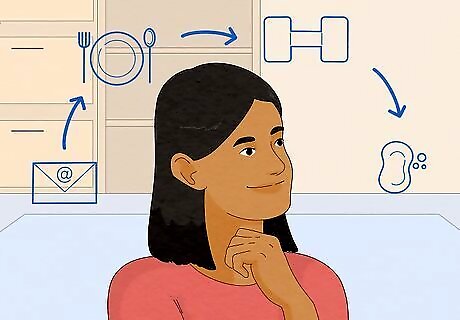
Plan your morning. Think about what you need to do that morning and make a mental list of your tasks. More importantly, recognize why these tasks are important and why waking up to do them is important.

Start doing something immediately. The longer you lay in bed, trying to muster up the ability to get out of bed, the harder it will be. But if you begin a task you are forced to begin your day, and the temptation to stay in bed will melt away. Make your bed, do some exercises, or start cooking breakfast right away to get your mind kickstarted and ready for the morning. If you are still struggling, start with an activity you can do in bed, like reading a book or responding to emails.


















Comments
0 comment